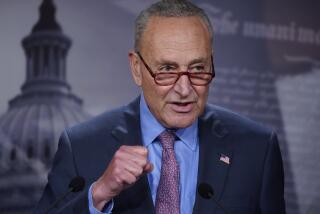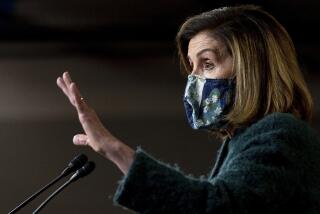Good Economic Medicine
- Share via
The war on terrorism has already forced the Bush administration to abandon its orthodoxy about going it alone in foreign policy. Now the very same thing is happening in domestic policy. The federal government is aggressively pursuing a government-is-good fiscal policy in the form of President Bush’s proposed stimulus package of $75 billion.
The lesson of the Japanese economy, which is still in the doldrums, is that governments need to stimulate quickly and forcefully. If the economy is still lagging in six months, the United States may well need to consider a new, expanded stimulus package.
The $75 billion currently proposed by the president is only about 1% of the gross domestic product, but it could ease the plight of those hit hardest by the Sept. 11 terrorist attacks and boost psychological confidence in the economy. Both are laudable goals. The administration has shown commendable flexibility in negotiating the terms. It’s congressional Republicans who are in revolt--against the Bush administration.
Business is eager for government largess. Already K Street lobbyists for every interest from car rental companies to General Motors Corp. are swarming the Capitol eager for the tax breaks that they were denied in the first round of tax cutting. Now the lobbyists are trying again.
Cutting the top corporate tax to 25% from 35% could cost the U.S. up to $900 billion over the next 10 years. Any such massive cut would bring with it the danger of inflation, prompting long-term interest rates to rise. What about accelerated depreciation for new investments? This too is unlikely to stimulate the economy.
Good investments are not an instant decision, and business is facing weak demand and overcapacity. For example, cable companies, members of one industry that is being considered for special tax breaks, are not about to lay more fiber optic cable in the current climate.
Nor does it make sense to accelerate the rate of income tax reductions that the administration passed this spring. These actions would not put the bulk of the money where it’s most needed most quickly: in the hands of middle-income Americans.
Fiscal prudence suggests that locking in rate cuts would constrain the government’s ability in the future to pay for stimulating the economy or the war on terrorism. Some of the future cuts should be deferred or canceled. And the capital gains tax cut being pushed by Senate Minority Leader Trent Lott could actually have the perverse effect of lowering stock values by prompting investors to seek quick profits.
What can be done? The less income a household has, the more likely it is to spend any extra money that becomes available. Congress and the administration should widen the income subject the 10% tax bracket and extend unemployment benefits.
Another measure that should be taken is to pay more of the health insurance premiums for all Americans who lost their jobs since July 1--not just those who worked for large companies and qualify for insurance under an obscure 1986 law called COBRA. The child credit, currently at $600, should be pushed more quickly than planned, to $800. Welfare reform will have to be revisited as well; benefits are now expiring for those unable to find a job since the act was passed in 1996. Job retraining aimed at filling the jobs now going begging--nursing, security, law enforcement--would also make very good sense. Finally, relief should be directed to the states, many of which have balanced-budget amendments, so they don’t undermine the federal stimulus package by raising taxes.
There is no guarantee that the stimulus package will work. But inaction is a recipe for failure. Just as in World War II and the Cold War, the need to reconstruct the nation is leading to an expanded role for the federal government and increased domestic spending. The U.S. cannot afford to do less.
More to Read
Get the L.A. Times Politics newsletter
Deeply reported insights into legislation, politics and policy from Sacramento, Washington and beyond. In your inbox twice per week.
You may occasionally receive promotional content from the Los Angeles Times.










